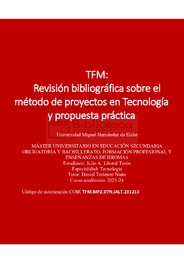Please use this identifier to cite or link to this item:
https://hdl.handle.net/11000/33140Full metadata record
| DC Field | Value | Language |
|---|---|---|
| dc.contributor.advisor | Turienzo Nieto, Daniel | - |
| dc.contributor.author | Liberal Terón, Julio | - |
| dc.date.accessioned | 2024-09-16T10:45:23Z | - |
| dc.date.available | 2024-09-16T10:45:23Z | - |
| dc.date.created | 2024-06 | - |
| dc.identifier.uri | https://hdl.handle.net/11000/33140 | - |
| dc.description | Especialidad: Tecnología | es_ES |
| dc.description.abstract | El método de proyectos, ha sido utilizado en diferentes formatos a través del último siglo, y en España, su aplicación está en claro auge, pese a sus dificultades de aplicación. El presente estudio, se ha realizado sobre la situación actual en cuanto a la aplicación del método de proyectos en las asignaturas de Tecnología de la ESO, a través de la revisión de diferentes recursos bibliográficos, para plantear posteriormente una propuesta de trabajo adecuada y adaptada al nuevo curriculum de la LOMLOE. Durante el proceso de revisión, se han analizado publicaciones de diverso tipo, desde documentación básica de editoriales, pasando por documentaciones avanzadas como libros especializados y documentación experta de trabajos de investigación científicas. Ciertas revisiones, han dado una perspectiva de la evolución del método de proyectos a lo largo del siglo XX hasta siglo XXI aterrizando en un nuevo método de aprendizaje basado en proyectos. Algunas revisiones, han destacado la dificultad en cuanto a la aplicación de este tipo de metodologías, y otras han ayudado a desarrollar un procedimiento que la haga exitosa. La dificultad de la aplicación del ABP en la actualidad, hace del Método de Proyectos en Tecnología, una herramienta de enseñanza-aprendizaje idónea para la consecución de los contenidos curriculares planteados en la nueva legislación y se presentan “los puentes de Davinci” como herramienta trasversal que abarcan gran parte de los resultados de aprendizaje del curriculum de tecnología de 4º ESO | es_ES |
| dc.description.abstract | The project method has been used in different formats throughout the last century, and in Spain, its application is clearly on the rise, despite its difficulties of application. This study has been carried out on the current situation regarding the application of the project method in ESO Technology subjects, through the review of different bibliographical resources, in order to subsequently propose a suitable work proposal adapted to the new LOMLOE curriculum. During the review process, different types of publications have been analysed, from basic documentation from publishers to advanced documentation such as specialised books and expert documentation of scientific research work. Some reviews have given an overview of the evolution of the project method throughout the 20th century and into the 21st century landing on a new method of project-based learning. Some reviews have highlighted the difficulty in applying this type of methodology, while others have helped to develop a procedure to make it successful. The difficulty of applying PBL at present makes the Project Method in Technology an ideal teaching-learning tool for achieving the curricular contents set out in the new legislation and "Davinci's bridges" are presented as a transversal tool that covers a large part of the learning outcomes of the 4th ESO technology curriculum | es_ES |
| dc.format | application/pdf | es_ES |
| dc.format.extent | 22 | es_ES |
| dc.language.iso | spa | es_ES |
| dc.publisher | Universidad Miguel Hernández | es_ES |
| dc.rights | info:eu-repo/semantics/openAccess | es_ES |
| dc.rights.uri | http://creativecommons.org/licenses/by-nc-nd/4.0/ | * |
| dc.subject | Aprendizaje basado en proyectos | es_ES |
| dc.subject | Herramientas educativas | es_ES |
| dc.subject | Currículum | es_ES |
| dc.subject | Tecnologías | es_ES |
| dc.subject | ABP | es_ES |
| dc.subject | Davinci | es_ES |
| dc.subject | STEAM | es_ES |
| dc.subject | Ingeniería | es_ES |
| dc.subject.other | CDU::3 - Ciencias sociales::37 - Educación. Enseñanza. Formación. Tiempo libre | es_ES |
| dc.title | Revisión bibliográfica sobre el método de proyectos en Tecnología y propuesta práctica | es_ES |
| dc.type | info:eu-repo/semantics/masterThesis | es_ES |

View/Open:
TFM Liberal Terón, Julio.pdf
787,02 kB
Adobe PDF
Share:
.png)
